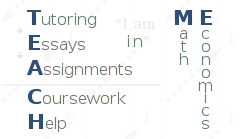Section 4: Problem 7 Solution
Working problems is a crucial part of learning mathematics. No one can learn topology merely by poring over the definitions, theorems, and examples that are worked out in the text. One must work part of it out for oneself. To provide that opportunity is the purpose of the exercises.
James R. Munkres
Let
and
. Define
, and for
,
. Show that the laws of exponents hold for
and
.
Using the theorem stated in the solution to Exercise 5, we can again, similar to Exercise 6, define
,
and
to be the sets of all integers
such that the first, second and third law of exponents, respectively, holds for all
and
. Then,
, as, by definition, for every
and
,
,
, and
.
To prove the “induction” step stated in the theorem of Exercise 5, we may find it useful to note that
for all
, regardless of whether
is positive, zero or negative. Indeed, if
is positive, then this is just by definition, if
then we have
, if
then we have
, and if
then
and, by denoting
,
, we have
, which follows from
. Similarly, for every
,
. This follows from the fact that
and
.
Now, if
, then for every
and
,
, and
, hence,
,
satisfies the conditions of the theorem, and
. If
, then for every
and
,
[using the fact that
]
, and
[using
again]
. Hence,
. If
, then for every
and
,
, and
. Therefore,
.
